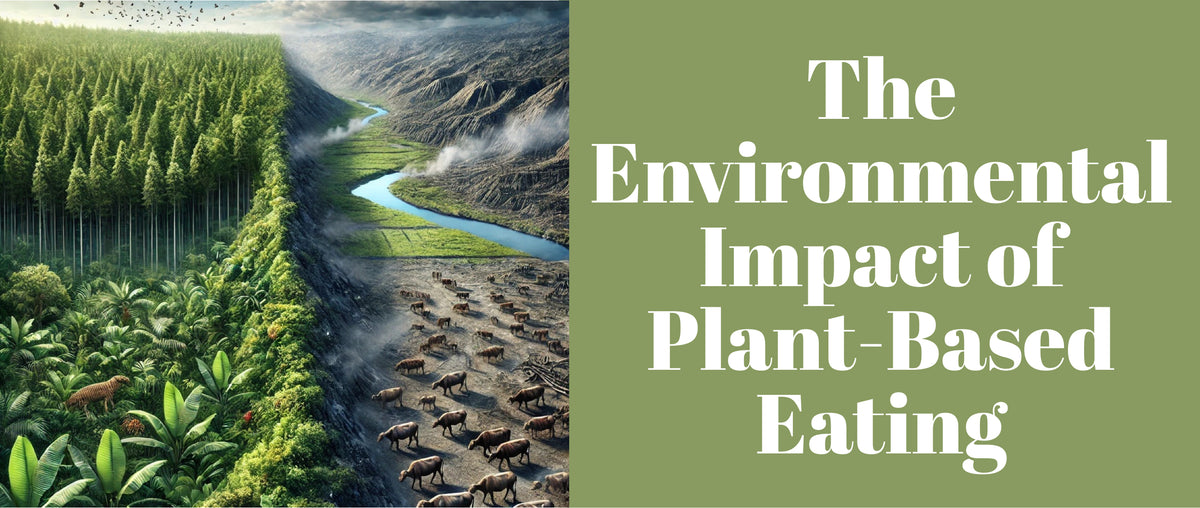The Environmental Impact of Plant Based Eating
As awareness about environmental sustainability grows, more people are turning to Plant based foods. This shift isn’t just about personal health but also about reducing the environmental impact associated with food production. Understanding the environmental benefits of a Plant based diet, including products like vegan cheese, cashew butter, and kombucha, can help in making informed dietary choices that benefit the planet.
Key Takeaways
- Plant based eating significantly reduces greenhouse gas emissions compared to meat-based diets.
- Consuming cholesterol-free foods like vegan butter and unsalted butter helps conserve water and land resources.
- Plant based diets support biodiversity and reduce deforestation.
- While there are challenges, including nutritional concerns and economic factors, the overall benefits of Plant based eating are substantial.
What is Plant based Eating?
Plant based eating focuses on foods derived from plants, including vegetables, grains, nuts, seeds, legumes, and fruits. This category also includes Plant based alternatives like Vegan Cheese, Oat Milk, and Garlic Butter. Plant based diets come in various forms, such as:
- Vegan diets: Exclude all animal products.
- Vegetarian diets: Include dairy and eggs but exclude meat and fish.
- Flexitarian diets: Primarily Plant based but occasionally include meat and animal products.
Common Plant based foods include:
- High Protein Vegan Food: Beans, lentils, tofu, and quinoa.
- Healthy Snacks for Kids: Fruits, vegetables, nuts, and seeds.
- Healthy Drinks: Kombucha, smoothies, and herbal teas.
- Low Fat Mayonnaise: Made from Plant based ingredients.
- Vegan Bodybuilding Diet: Rich in Plant based protein sources like legumes and nuts.

Environmental Benefits of Plant based Eating
Reduction in Greenhouse Gas Emissions
A significant benefit of Plant based eating is the reduction in greenhouse gas emissions. Animal agriculture is a major contributor to methane, nitrous oxide, and carbon dioxide emissions, which are potent greenhouse gases.
- Vegan Cheese and other plant based foods produce fewer emissions compared to traditional dairy products.
- Studies have shown that adopting a Plant based diet can cut food-related greenhouse gas emissions by up to 70%.
Table: Greenhouse Gas Emissions Comparison
| Diet Type | Greenhouse Gas Emissions (kg CO2e/year) |
|---|---|
| Omnivorous Diet | 2,300 |
| Vegetarian Diet | 1,500 |
| Vegan Diet | 1,050 |
Conservation of Water Resources
Water scarcity is a growing concern worldwide. Plant based eating helps conserve water resources in several ways:
- Producing Plant based alternatives like vegan butter and cashew butter requires significantly less water than animal products.
- Garlic butter made from Plant based ingredients also contributes to water conservation.
Table: Water Usage Comparison
| Product | Water Usage (Liters/kg) |
|---|---|
| Beef | 15,000 |
| Dairy Milk | 1,000 |
| Oat Milk | 48 |
| Cashew Butter | 2,500 |
Impact on Deforestation and Land Use
Plant based eating significantly reduces the need for extensive land use and deforestation, which are major contributors to habitat destruction and biodiversity loss.
- Traditional livestock farming requires vast amounts of land for grazing and growing animal feed.
- By contrast, growing plants for human consumption is much more land-efficient.
- Plant based foods like high protein vegan food (e.g., legumes, nuts) use less land compared to animal-based protein sources.
Table: Land Use Comparison
| Product | Land Use (m²/year) |
|---|---|
| Beef | 30 |
| Dairy Products | 15 |
| Plant based Protein | 3 |
Conservation of Water Resources
Water scarcity is a growing concern worldwide. Plant based eating helps conserve water resources in several ways:
- Producing Plant based alternatives like vegan butter and cashew butter requires significantly less water than animal products.
- Garlic butter made from Plant based ingredients also contributes to water conservation.
Table: Water Usage Comparison
| Product | Water Usage (Liters/kg) |
|---|---|
| Beef | 15,000 |
| Dairy Milk | 1,000 |
| Oat Milk | 48 |
| Cashew Butter | 2,500 |
Impact on Deforestation and Land Use
Plant based eating significantly reduces the need for extensive land use and deforestation, which are major contributors to habitat destruction and biodiversity loss.
- Traditional livestock farming requires vast amounts of land for grazing and growing animal feed.
- By contrast, growing plants for human consumption is much more land-efficient.
- Plant based foods like high protein vegan food (e.g., legumes, nuts) use less land compared to animal-based protein sources.
Table: Land Use Comparison
| Product | Land Use (m²/year) |
|---|---|
| Beef | 30 |
| Dairy Products | 15 |
| Plant based Protein | 3 |
Resource Efficiency
Plant based diets are more resource-efficient in terms of water, land, and energy use.
- Producing Plant based alternatives like vegan cheese and oat milk requires fewer resources than dairy production.
- High Protein Vegan Breakfast options such as smoothies with Plant based protein are efficient in terms of resource use.
Resource Efficiency Comparison
| Metric | Animal-Based Diet | Plant based Diet |
|---|---|---|
| Water Usage (Liters/day) | 15,000 | 2,500 |
| Land Use (m²/year) | 30 | 3 |
| Energy Input (MJ/kg) | 25 | 2 |
Impact on Pollution
The production of Plant based foods generates less pollution compared to animal agriculture, which is a significant source of soil, water, and air pollution.
- Livestock farming contributes to nutrient runoff, leading to water pollution and dead zones in aquatic ecosystems.
- Plant based diets reduce the need for synthetic fertilizers and pesticides, promoting healthier ecosystems.
Challenges and Criticisms
Nutritional Concerns
One of the main criticisms of Plant based eating is the concern over nutritional adequacy, particularly in terms of protein and essential nutrients.
- High protein vegan food options like legumes, nuts, and Plant based protein powders can meet protein needs.
- It's important to include fortified foods and supplements to ensure adequate intake of nutrients such as vitamin B12, iron, and omega-3 fatty acids.
Economic Factors
The economic implications of Plant based diets include considerations of cost, accessibility, and affordability.
- While some Plant based products can be more expensive, many staples like beans, lentils, and grains are affordable and nutritious.
- Healthy snacks for kids and budget-friendly options can be part of a cost-effective Plant based diet.
Cultural and Social Factors
Cultural and social factors play a significant role in dietary choices.
- Traditional diets often include animal products, and transitioning to a Plant based diet can face resistance.
- Education and awareness about the benefits of cholesterol free foods and heart healthy diets can help overcome these barriers.
Innovations in Plant based Foods
The future of Plant based eating looks promising with ongoing innovations in food technology.
- New products like high protein vegan snacks and low fat mayonnaise made from plants are continuously being developed.
- Market trends show increasing consumer interest in Plant based foods.
Policy and Advocacy
Government policies and advocacy play a crucial role in promoting Plant based diets.
- Policies supporting sustainable agriculture and Plant based food production can accelerate the adoption of healthy eating habits.
- Organizations advocating for heart healthy diets and Healthy Snacks for Kids contribute to public awareness and policy changes.
Global Adoption and Impact
The global adoption of Plant based diets has the potential to significantly reduce the environmental impact of food production.
- Case studies from different regions highlight successful transitions to Plant based eating.
- Projections indicate that widespread adoption of Plant based diets could greatly benefit the environment and public health.
Conclusion
Plant based eating offers substantial environmental benefits, including reducing greenhouse gas emissions, conserving water and land resources, and supporting biodiversity. While there are challenges, the overall impact on the environment and human health makes a compelling case for embracing Plant based foods like vegan cheese, cashew butter, and kombucha. By making informed dietary choices, we can contribute to a more sustainable and healthy future.
Do you enjoy vegan food? We have a list of vegan restaurants in India to help you find delicious options in your area!










